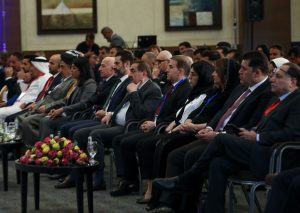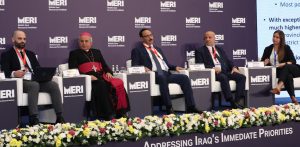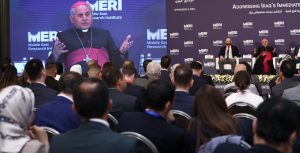Nineveh: People’s Needs, Aspirations and Perceptions
In this panel, discussions focused on Nineveh people’s needs, aspirations, and perceptions of governance in the province. Jessica Findley of the International Republican Institute broadly outlined the panel themes and invited contributions. She invited Osama Grizi of the United States Institute of Peace, to shared the key findings from a recent survey that the USIP had conducted, as part of their Conflict and Stabilization Monitoring Framework (CSMF), in March 2023 in Nineveh Province.
- Osama Al-Gharizi, United States Institute of Peace
- Najeeb Mikhaeel Moussa, Chaldean Archbishop of Mosul & Aqra
- Najim Al-Jubouri, Governor of Nineveh
- Zaidan Khalaf, Advisor to the Prime Minister of Iraq
- Jessica Findley, The International Republican Institute (Moderator)
The CSMF, Osma Al-Gharizi said, “is a framework that consists of over 100 indicators, looking at the themes of governance, rule of law, livelihoods, reconciliation, justice, security, and most recently climate change. We’ve done seven rounds of data collection since 2018”. The survey was done at the sub-district level in the districts of Hamdani, Talaafar, Sinjar, and Mosul. The results showed that “confidence in the central government and parliament is very low”. Across the four districts, 66 percent of respondents reported having little to no confidence in the central government and that it’s not working in their best interest. Confidence in parliament is even lower, however, with 80 percent of respondents across the four districts expressing little to no confidence that the legislator is working for their best interests”. Interestingly, “with the exception of Sinjar, citizen confidence in sub-district government actors [Qaimqam and Mayors] and institutions is high and much higher than those at the national level”. In relative terms, at the district-level government, “confidence is highest in Mosul [City], Talaafar, and Hamdaniya”.
In relation to the essential services, “44% of respondents believed that basic service needs are not being met in their areas”. Those most satisfied with services reside in Hamdaniyah, and those least satisfied are the residents of Sinjar, where only 10 percent say essential services are being met. Overall, “we see a negative trend on this indicator since round four, which was done in October and November of 2020”.

Interestingly, there is a strong overall support among communities in Nineveh for fiscal, administrative, and political decentralization. In Hamdaniy district, where there was the lowest support for decentralisation, respondents believe there’s a need to actually build up the capacity of subnational governance actors before more authorities devolve to them. They also believe that subnational government actors and institutions are “actually captured by larger political entities” where the intended impact of decentralization would “essentially be undermined”.
The data presented by Al-Gharizi also shows that across the four districts covered, political parties and security actors were identified as the top two type of actors “having excessive or inappropriate influence on district governing institutions and processes”. While 60% of the overall respondents do not believe that their authorities would better represent them if they’re from members of their ethno-religious group, however, in Sinjar, the Yazidi community overwhelmingly believes that serving their interest is contingent on ethno-religious affiliation of the authorities. Importantly, Nineveh people appear to have “very low confidence in elections as a mechanism for positive change”. 90% of Sinjaris and 70% in the city of Mosul showed little to no confidence in the election process, which they see as a vehicle to reinforce the existing status quo in favour of the larger national parties.
Finally, Al-Gharizi noted that security concerns, which were paramount at the start of the research in 2018, have become less so in Neneveh Province, indicating that the security situation has improved, and communities are more confident in the security processes. However, those concerns “have been supplanted” by concerns over governance, service delivery and economic livelihoods.
Reflecting on the data and commenting on the urgent needs of Nineveh, Archbishop Najeeb Mikhaeel Moussa, Chaldean Archbishop of Mosul & Aqra, started by stressing that one “cannot understand what is happening in reality without living in this region” or reading about its history. He said: “I am the son of Mosul and the son of Kurdistan at the same time. The archbishop of Mosul and Aqra and Zebar at the same time….. today I will convey to you an experience that is simple but profound”…. “The fights going on in Nineveh are not arbitrary, they are not coincidences. Instead, there are always those who yearn to claim what’s not theirs and for that they rely on methods that are sometimes humane and sometimes not humane”. He described the tragic incident of Al-Hamdaniyah where a large number of Christians were fatally exposed to a massive fire inside a hall during a wedding party. He recalled: “…. until yesterday, we had buried 122 bodies, and the youngest corpse, was approximately a year old. The day before yesterday, I buried with my own hands and prayed over a one-and-a-half-year-old body, it was an angel. What is this child’s fault? What is the fault of these young men, women, newlyweds and others? To pay a high price to whom and why?”

The Archbishop hoped that justice will be served and “the truth will be revealed in order to heal the grief of these victims….. The devil of conflicts lives on a volcano that is boiling from within and we do not know when it will explode”. He remained “very hopeful that, with this meeting, at MERI, the great facts will emerge and that this meeting will awaken conscience”. He acknowledged the role of those who helped in the tragedy: “This tragedy showed people their true colors. The truth about what the responsible authorities in Mosul and the Nineveh in general, and Kurdistan at the forefront, did in sending first aid, opening hospital and emergency doors, and sending real rescue teams to the site of the event, is something to be proud of”. Through this tragedy, we saw that there is one people with different minorities and different religions”. He concluded his inspiring spiritual presentation by calling for an end of conflicts.
Jessica Findley then turned to Najim Al-Jubouri, the Governor of Nineveh, who holds “a pivotal position in the local administration, directly interfacing with the people”. She asked him to elaborate on the specific challenges that he had faced in his efforts towards better governance, reconstruction and service delivery.
Najim Al-Jubouri: “If you had seen Mosul in 2017, a completely destroyed city. Every bridge of Mosul was completely destroyed. … In three years, we were able to restore all of the 11 bridges and added three more bridges….. All government departments were destroyed by ISIS. For example, we had 263 police centers. All of them were destroyed. Now, we were able to restore more than 160 of these. Also, hospitals and other buidlings were destroyed. We don’t say that Mosul is in a rosy state with services, but…… we have come a very long way….. We are proud that Al-Hamdaniya which is the most beautiful district in Iraq. The same is true for Bashiqa and Al-Qosh. The situation of Sinjar is a special case…. there is an international conflict present on the land of Sinjar. Most of the security threats that occur in Sinjar are not ordinary crimes, but as you know, there is an international conflict in the presence of armed groups inside Sinjar….. If the politicians leave us, because I consider myself a military man, we will be fine.
Al-Jubouri stressed that Nineveh and the Kurdistan constitute each other’s security depth, therefore should always have good relations, which will reflect positively on the situation in the governorate. Nineveh is the most diverse out of all governorates in Iraq, even more than Kurdistan. There are Arabs, Kurds, Turkmen, Yazidis, Muslims, Christians and Shabaks. “I love all people. I love all of them. I am as close to one as the next person”, he added, emphasizing that he does not discriminate between them. He listed several great achievements, naming Al-Hamdaniya services as an example, however, politics is the one that destroys things, according to the Governor. “Two years ago, I was considered a good man, praised by the Parliament as patriotic”, now the same Parliament says that: He is a Baathist, he must be removed.”
Jessica Findley then invited Zaidan Khalaf to shed some light on key strategic considerations and policy decisions that the Prime Minister’s government has made to address the specific needs and aspirations of the people in Nineveh and how that may tangibly improve public perception of the government.
In turn, Zaidan Khalaf stressed that the government of Mohammed Shia Al-Sudani “inherited a very heavy legacy of poor services and many problems… In the Prime Minister’s Office, there are specialized committees that evaluate all projects, including those of Nineveh Governorate. We had a visit to Nineveh Governorate and there was a comprehensive evaluation of all departments operating in the province and how to distribute projects on districts and sub-districts, including the Nineveh Plain. The province is still suffering from poor services according to the inherited legacy, and I toured with the governor and it was at an excellent level compared to the destruction suffered by the province during the liberation battle…. Today, the Prime Minister cares a great deal about Nineveh and Nineveh Plain with determination and we have committees formed to follow up on the projects…. The prime minister looks with a paternal view at all of Iraq, from Zakho to Fao. Personally, I have led several social reconciliation efforts in Bashiqa, Hamdaniya, Hadhar and other areas. We visited Sinjar and had a great job to provide services to the judiciary. As for the surviving [Yezidi] sisters, today the number receiving salaries has reached more than 1,141 survivors. In the past two weeks there has been a plan to distribute land to the surviving sisters. We also have 3,000 families who are included in the subject of social assistance. We have more than 3,000 families during the last phase who were included in the issue of the return grant for the displaced”.

Khalaf stressed that the security situation in Ninawa is stable, and there are specialized committees visiting the areas of Mosul and the Ninawa Plain and found the province enjoying safety in the presence of security forces, the Popular Mobilisation Forces and all those present. They have multiple projects in Nineveh province. Al-Ghazlani camp was referred for the residential investment project and the construction of the airport. They have a committee to visit Sinjar and the mayor of Sinjar will be appointed in coordination with the regional government.
On Sinjar Agreement, Khalaf added: “The government is committed to the Sinjar Agreement as it is one of the things on which the [government] program is built. The Sinjar Agreement consists of three aspects: security, administrative and project management….. Sinjar is well-secure, Iraq’s constitution is clear…. It indicates quite frankly that Iraq does not accept becoming a corridor or a base for foreign armed groups…. There is a committee formed under the chairmanship of the Minister of Foreign Affairs and he has a lot of work in this matter with the Republic of Turkey, and therefore this matter will be in the process of being resolved. With regard to the appointment of the mayor, we reached with Brother Ribar Ahmed, representative of the Kurdistan Regional Government, two very advanced understandings…. Under the direct supervision of the Prime Minister. As long as all the sessions that will be held, whether in Kurdistan under my leadership or Mr. Qassim Al-Araji or in Baghdad, the Prime Minister will be fully aware of them and constantly ask us that this issue must be resolved. A while ago, I spoke with the governor, and I had visited to Sinjar district more than once, and God Almighty willing, things will be good in a short period of time. Regarding the incident in Hamdaniyah, a committee has also been formed and we are waiting for the court’s decision.”
MERI Forum 2023
Addressing Iraq’s Immediate Priorities
10 & 11 October, 2023
Session 1: Nineveh: People’s Needs, Aspirations and Perceptions
Session Video

